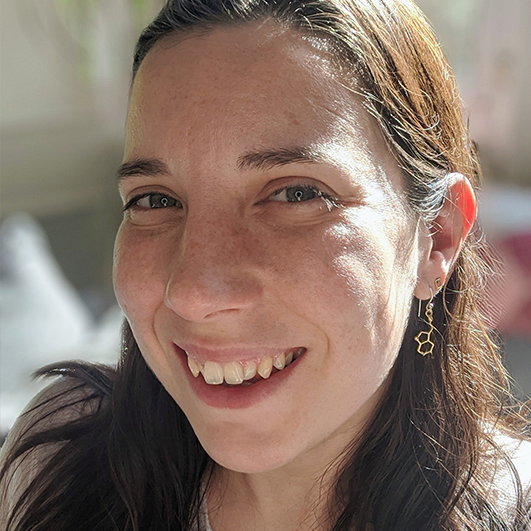18 January 2021
Learning from and Leading with the national Enhancement Theme

Author
Dr Jill R D MacKay
Lecturer (Veterinary Medical Education) at the University of Edinburgh
In this blog, Dr Jill R D MacKay, Lecturer (Veterinary Medical Education) at the University of Edinburgh, shares her experiences of developing and leading the Widening Participation with Lecture Recording Collaborative Cluster, and explains why the national Enhancement Theme model of collaboration and feedback is essential for continuous improvement in the sector.
Collaborative Clusters. The clue is in the name. In 2019, alongside my colleagues Dr Emily Nordmann from the University of Glasgow and Dr Jacqui Hutchison from the University of Aberdeen, I was a part of a national Enhancement Theme Collaborative Cluster exploring how lecture recording can support widening participation. Now that we have completed our cluster deliverables, and finished one of the most hectic teaching semesters of my life, I’d like to reflect on what it’s like to lead a collaborative cluster, the advantages of working across universities, and the personal outcomes of working in an enhancement-led framework.
Build new relationships
One of the great attractions of leading a collaborative cluster for me was the expectation that everyone would work together. My previous exposure to QAA events and collaborative clusters had always been distinguished by open conversations and creative working. I had particularly fond memories of attending an event for Beyond the Metrics: The Intangibles where we piloted an early version of the cluster’s new framework for evidencing the intangible aspects of the student experience. I was really impressed by how the leaders of that cluster were sharing their work at such an early stage, and how ready they were to accept feedback. The highly discursive and responsive nature of the collaborative clusters felt like a really great way of promoting a more robust review of work, and facilitating individuals with valid experience to step up, regardless of ‘where’ in an institution they came from. Working at a table with students’ union members, professors and professional services staff really helps you to consider all aspects of the higher education sector experience.
At the end of this particular event, I was made aware of the approaching call for new collaborative clusters. Coincidentally, I had recently been speaking with Emily Nordmann regarding potential ways to continue our shared interest in lecture recording research. I am a great admirer of Emily’s research, and her research ethos. She, too, is interested in open practice and sharing research. My colleague, Anne-Marie Scott, now Deputy Provost at Athabasca University, could tell that I was a little shy and arranged for the three of us to meet in an Edinburgh pub one evening to discuss. Anne-Marie then cheerfully told us to get writing and headed off (thanks for the push, Anne-Marie!). The Widening Participation with Lecture Recording Collaborative Cluster really started with a twinkle in Anne-Marie’s eyes.
Work collaboratively
Perhaps it’s because I moved disciplines, from vet medicine into education research, or perhaps it’s my introverted nature, but I have never found teamworking easy. Yet, the enhancement-led approach provides a brilliant framework for working collaboratively.
Emily suggested we invite her colleague Jacqui Hutchison (University of Aberdeen) to expand our experience beyond Glasgow and Edinburgh. Meeting with Jacqui was a great idea because she brought so much personal experience and institutional knowledge to our project. All three of us knew that we wanted to be pulling in experience from across the sector, and that it was important to try to include as many perspectives as possible. We deliberately designed our cluster around open meetings, much like the Intangibles meeting I’d attended.
We were keen to retain the flexibility in our planning to pursue avenues that the open meetings suggested. At our first meeting, we felt there was very little evidence about the actual experience of widening participation students in using lecture recordings, and so we quickly adapted our plans to include data collection. While this was not originally in our plan for the cluster, we were very conscious of the frustration our collaborators felt when trying to understand student needs.
Another example of our flexible leadership style came from our response to the COVID-19 crisis. We, along with everyone else, had to ‘pivot’ online back in March 2020. Our second open meeting was supposed to be in April, and as many people were still in the process of their own ‘pivot’, we switched to pre-recorded videos instead with a Twitter chat to provide engagement. This gave us the opportunity to create a more lasting resource for people in the sector.
Incidentally, it was on a walk along the Union Canal that Emily conceived of this paper, Ten simple rules for supporting a temporary online pivot in higher education, which we initially discussed within our cluster before expanding out. We felt that widening participation and accessibility were being missed from the discussions about teaching practice. Our most recent open cluster meeting had raised the concern that too often learning technology was brought in without considering the impact on specific cohorts of students, designing learning and teaching around a stereotypical student that doesn’t really exist. We felt it was so important to highlight that learning and teaching should be designed from the ground up to be accessible, even in a pandemic. Again, we recognised that we needed more perspectives to support the sector appropriately, and we used our cluster contacts to share and receive feedback on the preprint. It’s a personal achievement for me that a paper born from an enhancement-led approach has been so influential across the sector in such competitive times.
Get involved
If you think you might lead a collaborative cluster in the new Enhancement Theme, I would strongly advise you take the opportunity to build new relationships. I think it’s particularly useful for those relatively early in their careers to start building these networks. We felt very supported by QAA Scotland when we were sending worried emails to ask their advice regarding changing to online formats, and when we sheepishly kept adding research publications to our list of deliverables. I would also advise you to build flexibility into your schedules and be prepared to adapt new possible outputs you hadn’t considered at the start.
For me, working in an enhancement-led framework allows you to model best practice at all levels. As an institution, Edinburgh can share resources like its lecture recording resources and workshops on the Focus On Technology Enhanced Learning Hub, groups of researchers can share resources and funding to lead innovative work, and individual researchers can make steps towards transparency (see our pre-printed paper from this very cluster, and the associated focus group outline if you’d like to do similar work, and please do let us know what we could do better!) Ultimately, its easiest to improve when you have feedback, and leading the sector in this way allows us to be constantly improving.
QAA Scotland
Find out more about the work of our Evidence for Enhancement Theme and how you can contribute to the 2020-23 Theme, Resilient Learning Communities.
